Woman’s killing raised scrutiny over police response.
On the third day of deliberations, a jury of 12 San Diegans were in agreement. They would not be able to come to a consensus on the biggest charge facing Parrish Chambers Jr. They were split right down the middle, with six jurors believing he was guilty of second-degree murder for the death of Connie Dadkhah, while the other six were firmly of the mind that an involuntary manslaughter conviction was the only decision. Tense moments in the deliberation room often became heated.
“All the evidence was very clear to me,” Darla Bhatia told NBC 7. “I was astonished others didn't see the same.”
Stream San Diego News for free, 24/7, wherever you are with NBC 7.
“I was weighing the evidence, and I looked at it differently than they looked at it,” Jan Kennedy said.
“It was so emotional because there wasn't a conclusion to it,” Velne Barud said. “I think that's what made everybody so upset in the first place, is that we couldn't conclude this case.”
Get top local San Diego stories delivered to you every morning with our News Headlines newsletter.
In a special NBC 7 Investigates interview spanning nearly 90 minutes, four of the jurors in the case revealed what happened in the jury room, what guided their decisions and what they wished they knew about the case.
The killing of Connie Dadkhah

On June 14, 2022, Parrish Chambers Jr. scaled the side of a Rancho Peñasquitos condo. Once on the balcony, he smashed the sliding glass door to get inside and attacked Dadkhah. Those details were never in contention between the prosecution and the defense.
The prosecution said the attack killed Dadkhah. A medical examiner’s report said she suffered skull fractures and brain bleeds.
The defense had a different narrative, saying Dadkhah not only survived the attack, but reconciled with Chambers, had sex, and the two smoked methamphetamine together. They argued the meth caused the brain bleeds and her death.
Evidence and testimony during the trial revealed the pair had a two-year-long abusive relationship that centered on drugs.
The jurors

The murder trial began in mid-July and lasted roughly four weeks. Jurors put their lives on hold and sat through long days of emotional and complex testimony. For some, the case has left a lasting imprint on their lives.
“I’m different than I was before,” Michelle Mitchell said. “You know. Not in a bad way, but, you know, it does change your perspective on things.”
“I just couldn’t stop thinking about it,” Bhatia said. “I still think about it a lot.”
One thing that still lingers is the sound of Dadkhah's voice, heard on a recording of a 911 call she made about six months before her death. That happened during one of the instances where Chambers victimized Dadkhah, forcing her against her will into an SUV.
“It was very hard to hear,” Velne Barud said.
“To hear somebody in such distress is something that you take home with you, you know, is something that I played in my head long after I left for the day,” Mitchell said.
The impact of the attorneys

Jurors had a lot to say about the methods and style of the deputy district attorneys and Chambers’ public defender, Abe Genser. Early on during the trial, Genser made it clear he and his client weren’t denying much of the prosecution’s story.
“You are going to be tasked with answering the question: Why?” Genser said, "and it’s not going to be because Mr. Chambers wanted someone he loved dead. The answer is going to be because he was incredibly intoxicated. He didn’t know what he was doing and did something he is going to regret for the rest of his life.”
“It gave the defense attorney more credibility in my eyes,” Barud said. “I appreciated that he wasn’t trying to beat around the bush and say he’s innocent.”
It seems the defense attorney charmed most of the jury, winning major personality points, despite where they ultimately landed on the verdict.
“I liked how charismatic and kind he was,” Barud said. “When you’re defending someone such as Parrish, you have to fight the allegations of being this mustache-twirling villain that people assume that you are.”
“I also felt the defense attorney was excellent and really good at what he does,” Bhatia said. “Very dynamic and very — he was amazing.”
Conversely, some jurors took issue with Deputy District Attorney Trisha Amador, who often took a tougher tone during questioning.
“The prosecutor was so mean … saying, ‘You did this you did that,' ” Kennedy said. “You’re supposed to be innocent until proven guilty. It was just the way she approached it.”
Other jurors said they appreciated the work of the prosecution, which also included Deputy District Attorney Martin Doyle.
“I liked both of the prosecutors and the defense attorney,” Barud said. “I thought the prosecutors did their job well. They are supposed to attack the defendant. They are supposed to be mean. They didn’t really hold back on the defendant.”
Key testimony and evidence
Jurors said one of the most compelling moments in the trial happened when Chambers took the stand in his own defense. Some jurors found his story consistent, but others thought he was only credible when convenient.
“Anything that would have incriminated him, he conveniently just forgot,” Barud said.

Another moment that led to mixed reactions: The video recording of Chambers’ interrogation with detectives, taken just hours after first responders found Dadkhah's body. At one point, the video shows detectives walking out of the room, leaving Chambers alone. Seconds later, still alone in the room, Chambers picked up crime scene photos of Dadkhah's body and repeatedly asked out loud what happened, as if trying to speak to her.
“It didn’t really change my opinion at all,” Barud said. “You can be remorseful after killing someone, but that doesn’t really change the intent of the action itself.”
For others, though, that interrogation video was pivotal and a sign of genuine confusion.
“He did — I feel like he really was wondering what happened,” Kennedy said.
That confusion and Chambers' cooperation with police was proof, said the defense, that he never meant to kill Dadkhah. Some jurors saw those same actions entirely differently, however.
“To me, he would just be in way more trouble if he ran,” Bhatia said. “He stuck around, and I don’t think that proved any innocence whatsoever.”
The jury’s thoughts on the police response
“Obviously, law enforcement failed her,” Barud said. “That was my first takeaway: That it seemed like anyone in the law enforcement could have done so much to help Connie and prevent this entire thing from happening.”
Barud was referring to the scrutiny that emerged of the San Diego Police Department about the night Dadkhah died. Police dispatch records show it took officers two hours to arrive after the first 911 call, when neighbors reported Chambers was outside yelling and banging on the door. When police finally did arrive, it was still 45 minutes after neighbors had called 911 a second time, to report the break-in through the balcony glass door.
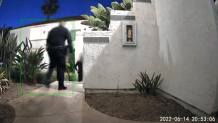
Once police arrived, they left about 15 minutes later when they weren’t able to make contact with Dadkhah. They told NBC 7 Investigates they didn’t force entry because they had reason to believe Chambers lived there, even though there was a court order in effect that mandated that Chambers stay away from her.
The jury was shown security-camera video shot from a neighbor’s home and heard 911 calls from neighbors.
“It was a moment of, 'Wait, what?' ” Mitchell said. “How many officers am I seeing? And they’re seeing what the neighbors are seeing, and they’re not taking it a step further? And then, listening to those phone calls with, I think it’s 911 and the neighbors. I mean, I was really surprised.
“It felt like they weren’t prioritizing the victim's safety,” Barud said. “It felt like they weren’t prioritizing the neighbor's safety. This was a problem that had been there for a while. The police knew and it seemed like they didn’t really care. And even if they did care, they didn’t show that they cared.”
“You would think they would have checked the records of that location and seen what had gone on before,” Kennedy said.
“It’s almost like they were maybe desensitized to it because they had been called so many times,” Mitchell said.
“And now it’s causing this sort of distrust in the community,” Barud said. “If I have a problem, can I trust the police … to come to my aid or are they going to brush it off and another tragedy can occur?”
Jurors wanted to know Dadkhah more
Between his testimony, interrogation and the security-camera video, the jury got to see and hear a lot from the defendant. Notably absent from the trial, though, was the victim: Connie Dadkhah. Jurors repeatedly expressed a desire to know more about her.
“We never got to see a photo of Connie pre-death,” Barud said. “The only photos we had of her was at the crime scene where she was already dead or her autopsy. And I think seeing those photos sort of dehumanized her even further because we didn't connect her to a living person. We just connected her to the victim, to the dead body.”
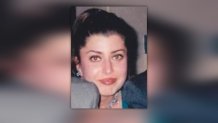
What little they did hear about Dadkhah's life mainly revolved around her meth use.
“The person that I know worked really hard to get out, and they are a real person,” Bhatia said, sharing her experience with a friend who struggled with meth addiction. “And Connie could have done that, too, if she had the chance.”
“I think that the defense definitely used that to make her less than,” Mitchell said. “And I think it worked on some of the jurors.”
Arguments in the deliberation room
It didn’t take long into deliberations for many jurors to realize they weren’t on the same page.
“I thought we'd be in there for a couple hours because I'm like, 'This is so clear,' " Mitchell said.
Jurors rewatched videos in pairs, making notes, looking for clues as minuscule as whether a bottle of alcohol appeared less empty over time in surveillance video.
“We went into a full-blown CSI whiteboard, graphs, timelines, charts, investigation,” Mitchell told NBC 7. “Everyone worked very well together in that space, but just didn't agree. I mean, you can read the same sentence and not agree.”
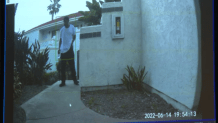
The biggest divide boiled down to whether Chambers was so drunk that he blacked out, and thus, legally, could not have committed murder.
“At one point, one of the jurors said, 'So you can just do something and say, "I was so drunk I forgot," ' ” Mitchell said.
“I felt like they had so much evidence,” Kennedy said.
Kennedy said she took stock in the anecdotal experiences of others on the jury.
“There was one young man who said he had experienced a blackout, or brownout, and he didn’t remember doing whatever he did when he ended up at home,” Kennedy said
Kennedy was also one of the jurors who found the defendant sincere on the stand.
“He said he didn't remember,” Kennedy said. “And I know he could have lied, but that was his story.... I felt like they had enough evidence showing that he was drinking.”
Kennedy also said she couldn’t be sure how Dadkhah died: Whether Chambers’ attack cracked her skull or if years of drug use had caught up with Dadkhah.
“I felt it was just a very fragile body because she had abused it for so long,” Kennedy said. “Sounded like it was years.”
All of that left too much room for doubt for Kennedy and five other jurors who sided with her.
“The judge, he said you have to have proof and evidence,” Kennedy said. “And these were all presented possibilities. There was no evidence. So I just couldn’t go with second-degree because of that.”
“I'm like, flabbergasted that you're not seeing it the way that I am,” Bhatia said. “And it just became completely useless, because at that point, we're not supposed to sway each other. We're supposed to interpret the law.”
“We did agree that nobody would ever actually have an exact idea of what happened,” Barud said. “The only people that would know are Parrish or Connie.”
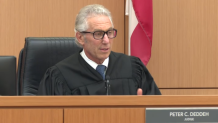
After three days of deliberation, the jury acquitted Chambers of first-degree murder but told the judge they were hung on whether he was guilty of second-degree or involuntary manslaughter. The judge sent them back to try again. Less than an hour later, though, they told the judge they weren’t going to budge on their opinions.
“We just really saw it differently,” Bhatia said.
The missing pieces that could have swayed jurors
During the interview, jurors were asked what evidence could have helped them reach a verdict.
“An exact time of death would have really helped,” Bhatia said. “When did she die? Did she get up and walk around after he smashed the door in? Did she die right away? Did they have a fight? How bad was it? What happened? The neighbor downstairs said she heard footsteps. Was it his steps? Was it her steps? We don't know.”
Something else that could have helped; proof of exactly how drunk Chambers was when he broke into Connie’s home, like a blood alcohol content test.
“I think that would have changed everything,” Mitchell said.
It’s not lost on this jury that both of those missing pieces could exist, had the officers who answered the night Dadkhah died done more.
“That’s a question that still lingers in my head today,” Barud said. “I wish I knew about the decisions behind their actions. Why did they do the things they did? Why did they wait so long? Why did they do anything about the defendant when they've gotten so many calls about this individual in the past? So that left me frustrated.”
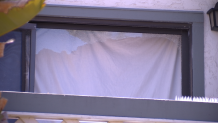
All four of the jurors NBC 7 spoke with believe Dadkhah might still be alive had police gone inside her home.
“I’d also like to see accountability from the police department and the people who, in my opinion, failed the victim,” Barud said. “I’d like to see accountability and I’d like to see change. When the trial ended, I felt like I don’t really trust the police department in my area.”
The future of the case
Often a jury verdict can bring closure to the victim's family. This trial didn’t deliver that ending. Instead, it was the victim’s cousin who delivered comfort to jurors in the hallway after the mistrial.
“She was optimistic about getting justice,” Mitchell said. “And that made me feel better because I felt like I failed the family, or I felt like I failed both sides of the trial. So seeing that she was holding it together for us, it made me feel better.”
“She didn't seem mad that she had to go through more or anything,” Bhatia said. “She just wanted justice for Connie.”
While jurors couldn’t agree on the murder charge, they did find Chambers guilty of two counts of battery and one count of false imprisonment. Those charges were connected to three other violent incidents between the two. He faces a maximum sentence of four years behind bars. However, he’s already served more than two years in jail while awaiting this trial and will add to that as he awaits the retrial.
At a court hearing Wednesday morning. prosecutors and the defense sparred over when that case will begin. It could happen as soon as November. A decision is expected next month. The defense also revealed the prosecution rejected a new offer for a plea. It’s the second rejected offer since the killing.
Click here to read up on what happened during the other days of the murder trial.



